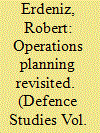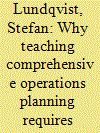| Srl | Item |
| 1 |
ID:
040923


|
|
|
|
|
| Publication |
New York, John Wiley and Sons, Inc., 1969.
|
| Description |
xiii, 311p.Hbk
|
|
|
|
|
|
|
|
|
|
|
|
Copies: C:1/I:0,R:0,Q:0
Circulation
| Accession# | Call# | Current Location | Status | Policy | Location |
| 002506 | 658.4034/McK 002506 | Main | On Shelf | General | |
|
|
|
|
| 2 |
ID:
141980


|
|
|
|
|
| Publication |
New Jersey, Prentice-Hall, Inc., 1971.
|
| Description |
xiv, 408p.hbk
|
|
|
|
|
|
|
|
|
|
|
|
Copies: C:1/I:0,R:0,Q:0
Circulation
| Accession# | Call# | Current Location | Status | Policy | Location |
| 007714 | 658.5/MIZ 007714 | Main | On Shelf | General | |
|
|
|
|
| 3 |
ID:
145858


|
|
|
|
|
| Summary/Abstract |
Parts of NATO’s contemporary planning framework called the comprehensive operations planning directive (COPD), and parts of the operation-level planning process should be revised since they suffer from methodological inconsistency. This claim is defended by discussing contradicting methodological properties and heuristics applied when framing and managing a military problem in accordance with the COPD. The methodological inconsistency within the COPD; in other words, simultaneously applying contradictory methodological properties, implies one theoretical and three practical implications. The theoretical implication is summarised in a meta-theoretical framework and explained by discussing five methodological properties: non-linearity, emergence, independently changeable generalisations, invariance and boundaries. The three practical implications of methodology imply that methodology is guiding: the problem-frame, conceptual development and action. To improve military planners’ understanding and management of these four identified implications, NATO is recommended to develop a “handbook of methodology.” The purpose of such a handbook should be to emphasise the utility of methodology when planning military operations.
|
|
|
|
|
|
|
|
|
|
|
|
|
|
|
|
| 4 |
ID:
139210


|
|
|
|
|
| Summary/Abstract |
This article argues that the method outlined in NATO’s Comprehensive Operations Planning Directive (COPD) manual is entirely based on systems theory and describes how to apply the principles for managing system change through comprehensive operations projects. Such systems thinking is based on conceptually different principles than traditional military planning methods. Students must therefore be provided with new conceptual tools to understand and handle the complex planning process outlined in the COPD manual. Thereto, they require knowledge of its founding scientific theories to meet academic standards. The concluding message is that military teachers and students must widen their individual mental frames of reference through a transformational learning process to obtain the comprehensive understanding required to fully manage the COPD process. Moreover, they need to prepare for facilitating dialogues in the less mature comprehensive operations planning teams of real-life situations.
|
|
|
|
|
|
|
|
|
|
|
|
|
|
|
|